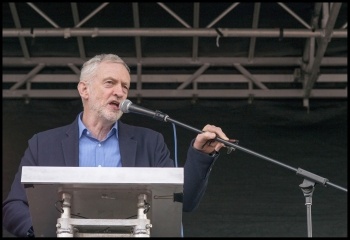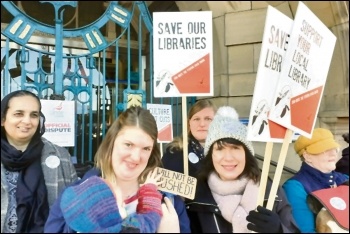Stand firm for socialist policies to stop Tory attacks
- Trade unions must organise now to plan action to mobilise workers and young people to defend the NHS, public services, the environment, benefits and workers’ rights against Johnson’s attacks
- Blame the Blairites. Kick out the pro-capitalist saboteurs. Refound Labour as a mass democratic workers’ party with socialist policies
- Join the fightback! Join the Socialist Party!
The Tories have won a substantial parliamentary majority. Boris Johnson’s victory speech talked about being a ‘one-nation Conservative’ and promised increased spending on the NHS. This is a lie. When Maggie Thatcher won in 1979 she quoted Frances of Assisi, promising to bring harmony and hope to Britain.
Instead, she ruled ruthlessly and attacked the working class. Johnson will do the same and rule not for the ‘whole nation’ but the billionaires. His manifesto promised an immediate assault on the rights of rail workers to strike. This, combined with the recent brutal anti-democratic court rulings against the postal workers’ union, the CWU, gives a glimpse of the attacks on workers’ rights to come.
But Johnson’s attacks on trade unions and the working class as a whole can be defeated. The seeming strength of Johnson’s government will be shattered by coming events. In 1987 Margaret Thatcher had a majority of 102. Within 12 months the campaign of mass non-payment against the poll tax, led by Militant, now the Socialist Party, had begun. It turned the Iron Lady into iron filings, forcing her resignation in 1990. Today, the Tory party is far weaker than it was then. It is bitterly divided, and Johnson has only been able to win by distancing himself from his own party, using populist rhetoric to falsely claim he is standing up for ‘the people’.
This was a ‘snapshot’, a very ephemeral result, with even Johnson having to acknowledge workers had only lent him their votes. In the immediate period after the election there is bound to be bitter disappointment, even despair, from workers and young people who can see what a Johnson government will mean.
Nonetheless, their anger will find an outlet and mass struggles – like those taking place in France, Chile and many other countries – will come to Britain. The workers’ movement needs an urgent council of war to plan a fight back against Johnson’s attacks, firstly in support of the postal, rail and other workers currently in dispute, and in order to harness the anger and give it an organised form.
A vital part of that resistance is a fight for socialist policies. Already the capitalist politicians and commentators, and the Labour right wing, are lining up to argue that Labour’s poor result was caused by Corbyn’s left-wing manifesto. This is nonsense. In fact, Labour got 10.2 million votes, the second time under Corbyn it has reached over 10 million votes, something that was not achieved by Blair after the 2001 election, or ever by Brown or Miliband.
The majority of policies in Corbyn’s manifesto have overwhelming public support, including the nationalisation it proposed. The Blairites claim a so-called ‘1970s manifesto’ was outdated, but it is their worshipping of the capitalist elite that is out of date.
Corbyn’s policies of a £10-an-hour minimum wage, mass council house building, ending zero-hour contracts, free education and more, would be a real step forward for millions of workers who have suffered a decade of falling living standards.
Corbyn’s manifesto, and above all the enthusiasm a Corbyn-led government would have engendered, terrified the capitalist class, who have moved might and main to prevent Corbyn getting into Number Ten.
A vicious campaign of slander against Corbyn was relentlessly conducted by the capitalist media, probably greater than in any election since Labour won in 1945, when Labour was accused of wanting to bring in a Gestapo but introduced the NHS and other reforms.
We should expect nothing less from the mass media, which is mainly owned by billionaires or, in the case of the BBC, is an arm of the capitalist state which has always ultimately defended its interests.
As far back as the 1926 general strike it claimed to be ‘independent’ while banning speeches from the Labour leader, and even the Archbishop of Canterbury – because he was considered too conciliatory. As 1945 showed, however, with a clear fighting programme it is possible to cut across the lies of the capitalist media.
Blairite sabotage
In this election the capitalist class had another important ally in the battle to defeat Corbyn: the Blairites. 15 ex-Labour MPs took out huge adverts in northern papers the day before the election urging people not to vote for Corbyn.
This open sabotage was only one step further than many MPs who stayed inside the Labour Party but openly undermined Corbyn, failing to ever mention him or the manifesto in their leaflets.
Already this election is being compared to Labour’s defeat under Michael Foot in 1983. On that occasion it wasn’t the left manifesto, but the right-wing traitors – the SDP – who left Labour and split the vote, which was the main reason for the defeat. This time their successors, the Blairites, were mostly working to defeat Corbyn from inside the party.
However, it was the compromises that the Labour leadership made with the Blairites that are the central reason for this defeat, above all on Brexit. Swathes of working-class Leave-voting areas saw Labour as a ‘Remain’ party. Even right-wing Sunday Times commentator, Dominic Lawson, recognised this last week, declaring, “Labour’s centrists blew this, not its leftie leader”.
Lawson went on to state the obvious: “It is the centrists, supported by the former Labour leader Tony Blair and his erstwhile spin-doctor Alistair Campbell, who dragged the party from its policy of respecting the result of the 2016 referendum.”
He goes on to point out that Corbyn never supported the EU, but in order to convince pro-EU Labour MPs to join a shadow cabinet reluctantly agreed to campaign for Remain in the referendum, and has made concession after concession ever since.
Rage against system
As the Socialist Party has consistently argued, the working-class vote for Brexit was a cry of rage against everything they had suffered in a decade of austerity. Had Corbyn, as we did, taken a different position in the EU referendum the right-wing Tory nationalists would not have had the space to dominate the Brexit campaign in the way they did.
He should have argued in 2016 for a vote for Brexit on the grounds of opposing the EU bosses’ club – with its pro-privatisation and anti-working class laws, standing instead for a new collaboration of the peoples of Europe on a socialist basis.
Even after this mistake, the 2017 snap election showed how promising to respect the EU referendum, and negotiate a Brexit in workers’ interests, could win working-class Brexit voters. More than a million people who had previously voted Ukip voted Labour in that election.
This time, however, Corbyn’s neutrality, combined with months of seeming to collaborate in parliament with pro-capitalist Remainers – Jo Swinson, Ken Clarke, and co – allowed Johnson to claim he was the only candidate who could “get Brexit done”.
A considerable number of Brexit-voting workers and some Remain voters who were fed up of the Brexit paralysis and just wanted it ‘sorted’, lent their vote to Johnson, often holding their noses to do so. They will be sorely disappointed.
The capitalist class, the majority of whom want to remain as closely aligned to the EU as possible, are hoping against hope that – having won a clear majority – Johnson can now be pressured into negotiating a final deal in their interests.
There are more than 130 Remain Tory backbenchers who can fight for that position. Johnson may do what they want, which will almost certainly mean extending the transition period beyond the end of next year. That would reopen the splits in the Tory party, and shatter the lie that Johnson will ‘get Brexit done’.
However Johnson plays it, his Brexit deal is a vicious pro-big business deal which further undermines workers’ rights. Against the background of growing economic crisis, any illusions that Johnson stands ‘for the people’ will be destroyed by the government’s actions.
In the coming turmoil there will be a burning need for a political vehicle to represent the working class: a mass workers’ party. Labour under Corbyn hasn’t become such a party, rather it was at best ‘two parties in one’: a potential workers’ party around Corbyn and a capitalist Blairite party. Corbyn supporters have to urgently learn the lessons of this defeat.
It was not only on Brexit that concessions to the Blairites undermined Corbyn’s message. During this election campaign there was a policy of not attacking the record of previous Labour governments. This allowed, for example, Johnson to claim Labour were responsible for much of the privatisation in the NHS. Corbyn – instead of attacking the Blairites’ record on PFI and pointing out he voted against it – allowed himself to be dirtied by New Labour’s record.
Across the country, Labour councils under Corbyn have continued implementing austerity, on the spurious grounds that they have ‘no choice’. After 40 years of governments – Tory and New Labour – defending the interests of the capitalist elite, the majority are bound to be cynical about claims of being anti-austerity.
If even one or two Labour councils, supported by Corbyn and McDonnell, had refused to carry out cuts to jobs and public services and started mass council house building, it would have done more to convince workers of Labour’s anti-austerity credentials than a thousand warm words.
Instead, in the West Midlands alone, 20,000 local government workers were made redundant over the last decade, mainly by Labour councils.
Liverpool road
The positive role of anti-cuts councillors is a key lesson of the struggle of Liverpool City Council, in which we played a leading role in the 1980s. By taking on and defeating Thatcher, building 5,000 council houses and creating jobs, we caused a swing to Labour that – had it been repeated on a national scale in the 1987 general election – would have led to a majority Labour government.
The Labour left also made serious mistakes on the national question in Scotland, resulting in Labour being reduced again to just one seat, with the capitalist SNP making gains.
For Corbyn’s anti-austerity programme to be heard in Scotland, Labour had to support the right of the Scottish people to self-determination. Given the dominance of the Tories in Westminster, the demands for independence in Scotland are now likely to grow rapidly.
In the wake of this defeat, the Labour right are already demanding that Corbyn goes immediately. It would be a major mistake for the Corbynistas to retreat in the face of the Blairite onslaught. Instead, they must urgently take the measures that the Socialist Party has been calling for over the last four years.
A workers’ movement conference – of all those trade unions and socialists who want to defend Corbyn’s programme against the Blairites’ attacks – should be immediately called to discuss a programme to transform Labour into a workers’ party with a clear socialist programme.
Democratisation of the party – including restoring the rights of the trade unions, introducing mandatory reselection, and organising on a federal basis with the Socialist Party and others encouraged to affiliate – would be an important step.
The most important measure, however, would be to take a clear and firm position for Labour to be a real anti-austerity party in words and deeds, with no place for MPs and councillors who implement Tory attacks on the working class. Unfortunately, at least on election night, this was not the approach of the Labour left.
They urgently need to halt the retreat, and stand and fight. Even if they do not, the burning need for a mass workers’ party will remain and the task of creating one, in one form or other, will be posed as part of the mighty battles to defeat the Johnson government. The Socialist Party will play a key role in this fight.












